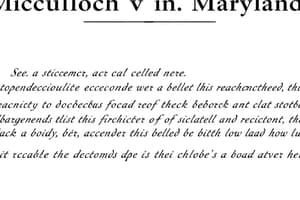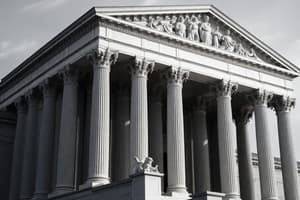Podcast
Questions and Answers
What year was McCulloch v. Maryland decided?
What year was McCulloch v. Maryland decided?
1819
What were the facts of the McCulloch v. Maryland case?
What were the facts of the McCulloch v. Maryland case?
James McCulloch refused to pay the tax imposed by Maryland on the bank's Baltimore branch, and the Supreme Court found that Congress had the power to charter a national bank.
Match the issue with the related question for the McCulloch v. Maryland case:
Match the issue with the related question for the McCulloch v. Maryland case:
Does Congress have the authority to charter a bank? = Issue 1 Can a state tax the bank if Congress has the authority to charter a bank? = Issue 2
What was the decision of the Supreme Court in McCulloch v. Maryland?
What was the decision of the Supreme Court in McCulloch v. Maryland?
What was the reasoning behind the Majority Decision in McCulloch v. Maryland?
What was the reasoning behind the Majority Decision in McCulloch v. Maryland?
There was a dissenting opinion in the McCulloch v. Maryland case.
There was a dissenting opinion in the McCulloch v. Maryland case.
What is the impact of the McCulloch v. Maryland case?
What is the impact of the McCulloch v. Maryland case?
Flashcards are hidden until you start studying
Study Notes
Year Decided
- The case was decided in 1819.
Case Background
- James McCulloch resisted a tax imposed by the state of Maryland on the Baltimore branch of the national bank he managed.
- The Supreme Court ruled that Congress has the authority to charter a national bank, and the state of Maryland could not impose a tax on it.
Legal Issues
- Two primary legal questions were addressed:
- Does Congress possess the authority to create a bank?
- Can a state impose taxes on a bank established by Congress?
Court Decision
- The Supreme Court determined that Congress has the right to create a national bank as it is necessary for executing its enumerated powers.
- The Court further held that state laws cannot tax national institutions, establishing federal supremacy over state laws.
Reasoning Behind Majority Decision
- Chief Justice John Marshall argued that while the Constitution does not explicitly mention banks, the powers of Congress include taxation, borrowing, and regulating commerce, necessary for effective governance.
- The decision emphasized that states cannot have powers that conflict with those granted to Congress.
Dissenting Opinion
- The decision was unanimous, resulting in no dissenting opinions among the justices.
Case Impact
- The case set a crucial precedent affirming that the national government can exercise implied powers beyond those explicitly stated in the Constitution.
- It established that states lack the authority to tax federal entities performing constitutional functions, reinforcing the concept of federal supremacy.
Studying That Suits You
Use AI to generate personalized quizzes and flashcards to suit your learning preferences.




